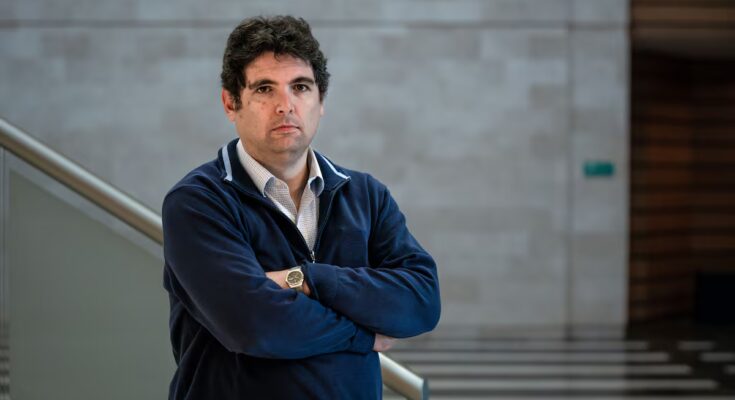At the foot of the mountain range of Santiago de Chile, in the Signos Center of the University of Los Andes, where he is also a professor, is the office of Daniel Mansuy (Valparaíso, 47 years old), director of the aforementioned studies and research unit. Next to a large window that allows you to see the greenery and the mountains, there is a bookcase and a desk where, among others, the family images are distributed – that of the sailor father, those of his seven children – and the four volumes of a critical edition of Democracy in America (1835-1840), Alexis de Tocqueville’s work on the challenges and opportunities of democratic societies based on the case of the United States.
It is no coincidence: this Doctor of Philosophy from the University of Rennes (France) admires the author of The Old Regime and the Revolutionand has long studied the intellectual influence that Aristotle had on him. That’s all, and he admits that the distance from the center and other places in the capital “where the potatoes burn” gives him calm and time to reflect. Naturally he appreciates the proximity to those places where the immediacy of politics besieges.
Also associate researcher at the Institute for Society Studies (IES), speaker for T13 radio and CNN Chile, columnist in Mercuryfull member of the Chilean Academy of Social, Political and Moral Sciences and host of the book’s podcast ReplyMansuy is a distinctive and sought-after voice in the intellectual space of the Chilean right.
Moreover, it is from the right that the left thinks, to the point that for the fiftieth anniversary of the military coup of 1973 it published Salvador Allende, the Chilean left and Popular Unitya book that President Gabriel Boric has publicly recommended. The leader of the Frente Amplista, however, did not comment on the matter The innocent in power (Taurus, 2025), severe – at times implacable – chronicle of the generation that in a decade went from street protest to the Palacio de La Moneda, and which in his opinion “has never had a political project in the strict sense”.
Now that presidential and parliamentary elections are upon us, Mansuy integrates this vision into a complex political picture. And we start from the scenario that would be created if, as the polls suggest, the official candidate, Jeanette Jara, were defeated in the second round by one of the representatives of the right: José Antonio Kast (Republican Party), Evelyn Matthei (UDI – Chile Vamos) or Johannes Kaiser (National Libertarian Party).
If the left goes into opposition, the analyst thinks, “it will have to think about what had to happen in its government, how many expectations it will have frustrated, so much so that its great legacy is that between Kast and Kaiser they will add 40 points, or at least 35. The Government and the Frente Amplio will have a certain responsibility in this phenomenon, and it is something they cannot ignore. So, when the left criticizes Kaiser so radically for reasons that can be understood, I hope that someone will reflect and say: “well, we made it possible”: they must take responsibility for the political mistakes they made to make this happen.”
For this reason Mansuy declared that Kaiser is Boric’s son and believes that the ultraliberal candidate’s entourage should take note that “a very strong identity discourse becomes a boomerang when it comes to governing”. For this reason, “if one has a vocation to power, it seems that the identity discourse is of little use. Therefore, the right that has a vocation to power should distance itself from the identity discourse that cost the Broad Front so dearly and which made the Kaiser himself so nervous.”
Having said the above, and beyond the stakes in this Sunday’s elections, which are not small, the academic considers 2025 as “one of the flattest electoral campaigns in our recent history”. In this context, “Jeannette Jara entered the field a little defeated, Evelyn Matthei was very erratic and failed to show a programmatic line that could convey anything, and Kast has run a very conservative campaign since he was in office. pole position win the second round.”
Therefore, those who occupy the first three places in the polls – Jara, Kast and Matthei – “are candidates who are not very original, not very innovative, not very risky and, therefore, with little space to discuss the proposals. And this will mean that whoever wins will have difficulties, because the campaign serves to build political capital, it serves to build political experience, and this is what didn’t work”.
And as for the right, the academic adds, “we don’t know much about what its candidates want to do to reactivate the economy or how they want to control security beyond the ‘hard hand’ slogan.” In “this environment rather form (boring) Kaiser is the candidate who managed to convey something.” But that’s not all about this political figure who showed growth in the last known polls before the voting ban came into force:
“Kaiser speaks to an audience that was in danger of extinction after October 18,” thinks Mansuy, who believes that for the national-libertarian “it would be bad to go to the second round, as absurd as it may seem” (…) “I think his task is to be as close as possible to Kast (but not beat him), because the second round is too solitary and (he) has no team.”
Furthermore, although the author is one of those who do not believe in the cliché that the second presidential round is a new election in which everything starts from scratch, he ventures that “if Kaiser were to pass to the second round, it would really be another election, because it is a scenario in which no one has put himself.”
A tired country
“Maybe the country was tired after a 2019-2023 cycle of great political intensity and with an infinite number of elections. It could also be that: the ultra-politicized cycles were followed by rather depoliticized cycles, because people are exhausted, and this cycle may have been exhausting for citizens,” says Mansuy about what has been happening in Chile since the social explosion of 2019 and which had a key moment in September 2022, with the rejection of the proposed proposal for a new Constitution. And while partially sharing what Ascanio Cavallo wrote in the days of the revolt – “when the far left wins, the far right also always wins” -, he thinks that “after the revolution – which in this case was not a revolution, but wanted to be – the hangover of order always arrives. Therefore, if one does not know how to guide and manage that inspiring moment for the left, what comes is the re-establishment of order, and this may arrive sooner or later, but it is something similar to a law of the story.”
For the academic, a possible end of the cycle is not synonymous with a return to the more predictable and consensual days of the democratic transition: “A certain part of the elites dreamed until January of a Matthei-(Carolina) Tohá second round, which was like a return to the 90s, and many people have seen that film – ‘Chile is back to normal’ – but this is completely losing sight of the fact that Chile does not fall into that category, so the talk of unity and agreements is an absolutely insufficient speech.”
Now, beyond the errors of Matthei, who “never found a clear message”, or of a Kast who opted for circumspection and left the radicalism to Kaiser, Mansuy is aware that this is a historical moment that can also be a trap: “In the May 2021 elections, the right has practically disappeared, so in certain sectors there is a very strong feeling of revenge, which can be pathological if poorly managed. The right now has the same challenges that the left had four years ago ago, but that feeling exists.



